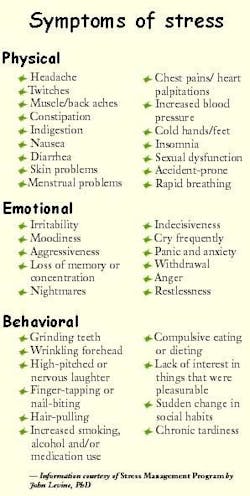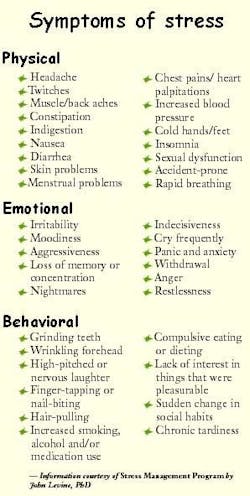High anxiety
Going to the dentist doesn't have to be a stressful experience.
by Ann-Marie C. DePalma, RDH, BS
Julie arrived at the periodontist's office. This was her second visit; she had already been to the office for an initial consultation for a crown lengthening of tooth No.15. The extent of the tooth fracture was unknown, and there was some doubt about whether a crown would be possible. She had just undergone a root canal two weeks before on the tooth and wasn't looking forward to the surgical procedure. Foremost in her mind was what had happened following the root canal. The procedure itself wasn't that bad, although she had been in the chair for two hours. But, later that day, she developed a severe headache, became nauseous, and vomited. Julie thought it was probably a reaction to the post-procedure medications or even to the local anesthetic. But somehow she wasn't quite sure.
She mentioned all of this to the periodontist, who agreed to use an alternate anesthetic. But she was nervous while waiting in the reception area. When the assistant called her name, she walked into the operatory. However, as soon as she sat down, she burst into tears. The worry and concern over the procedure was overwhelming; a meltdown was inevitable.
Julie was experiencing a typical reaction to the stress brought on by her fear. The assistant and the other office staff, with the doctor's and Julie's permission, immediately acted to help alleviate her stress and make the procedure more manageable. They talked with her calmly, gently touching her arm for reassurance. They offered her decaffeinated herbal tea, along with a snack. She was allowed to sit in the reception area for awhile as well. After determining that her husband could drive her home after the procedure, the doctor gave Julie a small dose of Valium.
She eventually re-entered the operatory, where the assistant coached her with some progressive relaxation exercises. Julie managed the procedure well, and did very well during the post-operative period. Julie no longer experiences extreme stress when at the dentist, and even enjoys her visits!
How can patients overcome their fears and learn to view dental visits positively? It can be done if the practitioner understands the role of stress and how to help patients deal with it.
What exactly is stress? Stress is the "wear and tear" we feel as we react to a continually changing environment. Stress can be "good" in that it compels us to action, as in getting married. "Bad" stress, as in the loss of a job, can result in feelings of anger, distrust, or depression, and negatively affect our health and relationships. Stress can add challenges and bring us new opportunities. Stress helps, or hinders, depending on how we react to it.
Stress and tension often are unavoidable. Many people feel that our world, with its increasingly complex and rapidly changing situations, is more stressful than ever. This is due partially to the weakening of societal ties.
The support that extended families and communities used to provide is rapidly disappearing. People are more self-involved and increasingly isolated. Work can be a major source of stress. We constantly are asked to do more with fewer resources. Technology such as e-mail, voicemail, and cell phones make "escaping" impossible. "Down time" is virtually nonexistent.
Stress is a physical state that produces observable symptoms, not just vague nervous tension. Each of us responds to stress differently. What you experience as stress symptoms, I may not. These signs are nature's way of telling us to change our activities and/or mindset, and seek diversions or alternatives. These symptoms range from mild to severe. As these stress signals go beyond the body's physiological adaptive range of coping, a transition into "distress" can occur and produce clinical manifestations. Julie was stressed from thinking about the impending procedure. She was able to control her stress until she was faced with the actual procedure. At that point, her body's resistances collapsed and she dissolved into tears.
The body has a built-in defense system that responds to stress in a three-tiered manner. First is the "alarm" stage, commonly called the "fight or flight" stage. The body exhibits changes resulting from exposure to a stressor, including increased heart rate and breathing. The release of hormones from the adrenal cortex -particularly cortisol - may cause the adrenal gland to become enlarged and hyperactive. This enlargement may cause the thymus gland and lymphatic system to shrink, which decreases the body's immune response system.
The next stage is resistance, where the body attempts to "repair" the damage from continued stress. The body adapts to the stressor. Signs of alarm, such as increased heart rate and breathing, will decrease; the body recognizes the stressor but doesn't over-react to it. The exhaustion stage occurs after long-term exposure to the same stressor, to which the body had previously adapted. The signs of alarm will return but this time will be irreversible. Stress-induced hypertension is one such example of the exhaustion stage. The part of the body that reacts to the stress - a headache, or stomach upset, for example - is usually the "weakest link" in the body, the one that always acts up when under stress. Stress is the ultimate "mind-body" connection.
Stressed about dentistry
How do these facts relate to the dental patient? Dentistry is a stress-inducing situation for countless people who would rather be anywhere else than in the dental office. How does the hygienist deal with patients who hate going to the dentist and are "stressed out" over the experience?
As with our patient, Julie, speaking to the patient calmly and with reassurance can do wonders. A gentle touch on the arm or hand, if the patient is agreeable, conveys a wealth of understanding. Explaining procedures in easily understandable terms is always beneficial. It is also very helpful to reword common dental phrases to neutralize their negative connotation. For example, instead of saying, "This injection will hurt," try saying, "You will feel a stick followed by some pressure."
Giving the patient positive reinforcement can go a long way in alleviating stress. Experienced hygienists say the use of soothing music in both the reception area and operatory has helped in their offices. Others use scented oils or candles if acceptable to the patient and other office staff. Another popular technique to help reduce our patients stress is progressive relaxation. This technique uses focused imagery tools that help patients refocus their energy to a more positive state.
Here's how it works.The hygienist first explains the basic steps and then places the patient in a supine position. Speaking slowly and clearly, the hygienist instructs the patient to first close her eyes and then take several deep breaths. Next, the hygienist instructs the patient to focus on her toes and feet, and then to tighten her feet. The patient holds a few seconds, and then releases. Do this a few times, and then have the patient take several deep breaths. Continue using a calm, reassuring voice. Repeat the steps, asking the patient to next tighten her legs. Do this several times.
After the final leg release, the hygienist instructs the patient to take another deep breath, and to sink into the chair while exhaling. She encourages the patient to relax and imagine something positive, like floating on a raft on a warm, sunny day. After a few more deep breaths, most patients can proceed with treatment.
Relaxation techniques are usually sufficient for the average dental patient. However, it may not be perfect for everyone; the patient and the practitioner must be willing to work together to accomplish the goal of stress reduction. Hygienists must be sensitive to the patient's needs and wants, offering suggestions about what may be appropriate. In Julie's case, the staff first gained her confidence before attempting PRT. The patient is always the final judge about what will be helpful.
Hygienists are also subject to stress, and can benefit from stress-reduction techniques. If progressive relaxation doesn't work for you, then some of these suggestions might help.
• Review long- and short-term goals and eliminate those you cannot realistically reach (know when to say "no").
• Establish priorities and give yourself reasonable time to accomplish tasks.
• Exercise regularly. If not 20-30 minutes each day, then put in several 10-minute intervals each day.
• Eat a balanced diet, and limit the intake of fat, sugar, and caffeine. Drink plenty of water (drink two cups of water for every cup of coffee or tea you consume).
• Enjoy a long, warm bath or shower at the end of each day.
• Get organized! Get lunches, school supplies, and clothes ready the night before. Pick up regularly to make household chores less overwhelming. Wash dishes the night before so that the new day starts off "fresh." Plan special events on the calendar as soon as you become aware of them. Make the most of family time; incorporate your family in things you need to do or put off chores to be with them. Learn to multi-task effectively, plan the week's meals ahead, read mail daily and weed it out as it comes in (do the same with children's papers).
• Acknowledge difficulties. Admit that certain situations are beyond your control, but that you don't need to "lose control."
• Do a mental "get-away." Practice yoga or other relaxation techniques such as deep-chest breathing.
• Seek support - you don't need to do it all alone! Don't be afraid or ashamed to ask for help.
• Laugh and have fun!
Stress is an inevitable part of our daily life and the lives of our patients. However, it doesn't have to control us. We can learn how to control stress and make it work for us to give us a better perspective on our lives.
Ann-Marie C. DePalma, RDH, BS, is a 1978 graduate of the Forsyth School for Dental Hygienists. She is active in the Massachusetts Dental Hygienists` Association, having served in various positions. She can be reached at (781) 245-8811.

